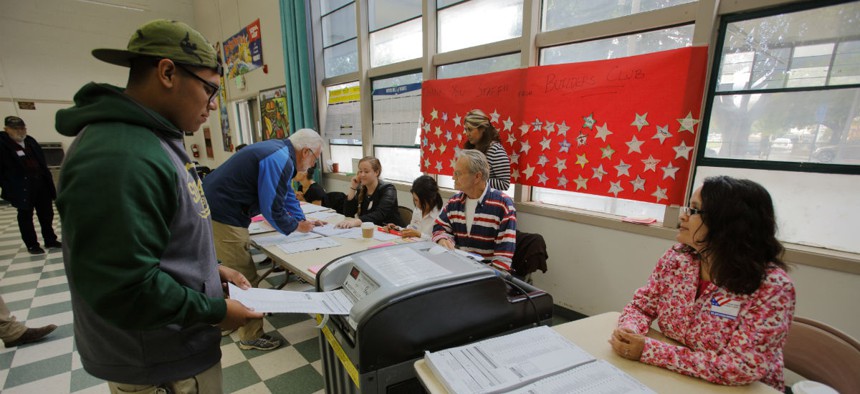
A man turns in his ballot in Ventura County during the California primary June 7. Joseph Sohm/Shutterstock.com
Justice Department Dispatches 500 to Monitor Polls on Tuesday
A 2013 Supreme Court case limits the federal role, attorney general notes.
Amid scattered news reports of threats of private citizens challenging voters’ eligibility on Election Day, the Justice Department’s Civil Rights Division is sending more than 500 trained and multi-lingual employees to polling stations in 67 jurisdictions in 28 states, the department announced on Monday.
“The bedrock of our democracy is the right to vote, and the Department of Justice works tirelessly to uphold that right not only on Election Day, but every day,” said Attorney General Loretta Lynch. “We enforce federal statutes related to voting through a range of activities – including filing our own litigation when the facts warrant, submitting statements of interest in private lawsuits to help explain our understanding of these laws, and providing guidance to election officials and the general public about what these laws mean and what they require.”
But as Lynch herself acknowledged last month to a Latino civil rights group, the department’s ability to watch for violence or intimidation on authority going back to the 1965 Voting Rights Act was “severely curtailed” by the 2013 Supreme Court decision Shelby County v. Holder.
Vanita Gupta, assistant attorney general for civil rights, said this week, "In most cases, voters on the ground will see very little practical difference between monitors and observers. We work closely and cooperatively with jurisdictions around the country to ensure that trained personnel are able to keep an eye on the proceedings from an immediate vantage point.”
In the run-up to and all day on Election Day, Civil Rights Division staff will operate a hotline for reports of legal violations or possible violence (1-800-253-3931 or 202-307-2767 or TTY 202-305-0082). In addition, individuals may also report complaints by fax to 202-307-3961, by email to voting.section@usdoj.gov. Local law enforcement, however, should be contacted first, the department said.
The designated jurisdictions being monitored are in Alaska, Arizona, California, Connecticut, Florida, Georgia, Illinois, Kansas, Massachusetts, Michigan, Nebraska, Nevada, New Jersey, New Mexico, New York, North Carolina, North Dakota, Ohio, Pennsylvania, Rhode Island, South Dakota, Tennessee, Texas, Utah, Virginia and Wisconsin.
According to the announcement by Justice, monitors will gather information such as “whether voters are subject to different voting qualifications or procedures on the basis of race, color or membership in a language minority group; whether jurisdictions are complying with the minority language provisions of the Voting Rights Act; whether jurisdictions permit voters to receive assistance by a person of his or her choice if the voter is blind, has a disability or is unable to read or write; whether jurisdictions provide polling locations and voting systems allowing voters with disabilities to cast a private and independent ballot; whether jurisdictions comply with the voter registration list requirements of the National Voter Registration Act; and whether jurisdictions comply with the provisional ballot requirements of the Help America Vote Act.”
Image via Joseph Sohm/Shutterstock.com.







